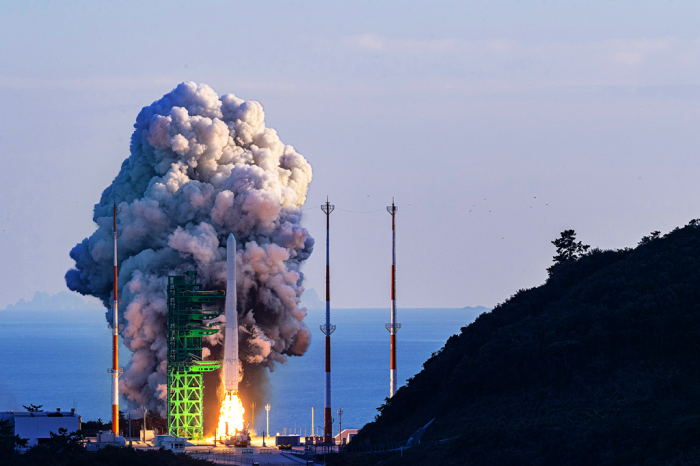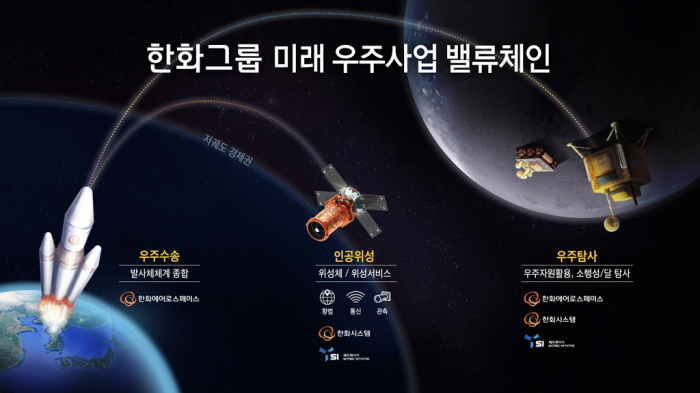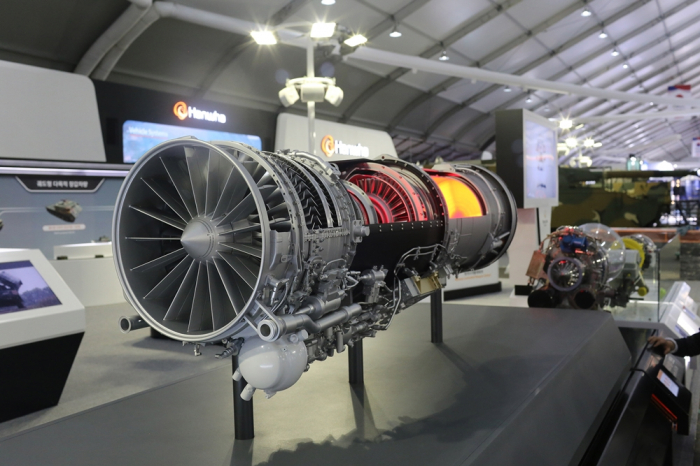Hanwha Aerospace to launch 4 more Nuri rockets under $220 mn project
Through a series of mergers and acquisitions, Hanwha Group aims to enhance its presence in the aerospace business
By Dec 02, 2022 (Gmt+09:00)
MBK’s Korea Zinc takeover attempt to spur search for white knights


Korea Zinc, MBK face proxy war for zinc smelter


Korea Zinc shares skyrocket after buybacks in tender offer


Lotte to liquidate rubber JV in Malaysia, sell overseas assets for $1 bn


Samsung to unveil 400-layer bonding vertical NAND for AI servers by 2026



Hanwha Aerospace Co., South Korea’s answer to Elon Musk’s SpaceX, is planning on four additional launches of the country’s first homegrown space rocket, Nuri, by 2027 as part of a 286 billion won ($220 million) government project.
The aircraft engine parts-making unit of Korea’s Hanwha Group said on Friday it has been designated by the state-run Korea Aerospace Research Institute (KARI) to take charge of a project to upgrade the Korean-type space projectile.
Under the deal, Hanwha and the KARI will jointly manufacture three Nuri rockets from next year and launch them into space four times, including a blast-off scheduled for 2023, over the next five years.
Hanwha said it will also acquire technologies related to the operation and launch of Nuri from the state-run research institute.
The project, led by Korea’s Ministry of Science and ICT, is to support companies’ efforts to enhance space exploration capabilities with a government budget of 687.3 billion won.

In June, Korea opened a new space era as it successfully launched its first homegrown space rocket carrying payloads to become the world’s seventh country with advanced aerospace technology capable of sending at least a 1-ton satellite into orbit.
With the Korean Satellite Launch Vehicle Two (KSLV-II), nicknamed Nuri, meaning the world in Korean, the country succeeded in putting satellites into orbit on its second attempt.
Nuri is a work of collaboration involving some 500 aerospace experts from more than 300 different Korean firms, including Korea Aerospace Industries Ltd. (KAI), Hanwha Aerospace, Space Solution Co., S&H Co., Vitzro Nextech, Neospec Co., Samyang Chemical and Hy-Lok Co.
Korea’s future plans call for launching surveillance, navigation, and landing a lunar probe, the Korea Pathfinder Lunar Orbiter.

SPACE HUB
Hanwha Group has been spending heavily on its aerospace business since the launch last year of Space Hub, a group-wide task force handling all future mobility-related projects.
The task force is led by Kim Dong-kwan, the eldest son of Hanwha Chairman Kim Seung-youn and the group’s heir apparent.
In 2020, Hanwha Systems Co., the defense and air mobility unit of the conglomerate, acquired Phasor Solutions Ltd., a British company that makes antennas for satellite communications. The acquired company was later renamed Hanwha Phasor.
Hanwha Systems has also made an equity investment in Kymeta Corp., a US satellite communications firm.
Last year, Hanwha Systems acquired an 8.8% stake in UK’s satellite communications firm OneWeb for $300 million to expand its presence in the growing commercial space market.
Hanwha Aerospace, which recently merged with Hanwha Defense Co., also plans to absorb Hanwha Corp. in March next year to seek organic growth in the space business.
Write to Jae-Fu Kim at hu@hankyung.com
In-Soo Nam edited this article.
-
 Mergers & AcquisitionsHanwha Aerospace, Hanwha Defense likely to merge
Mergers & AcquisitionsHanwha Aerospace, Hanwha Defense likely to mergeJul 25, 2022 (Gmt+09:00)
5 Min read -
 Aerospace & DefenseS.Korea ushers in new space era with rocket launch success
Aerospace & DefenseS.Korea ushers in new space era with rocket launch successJun 21, 2022 (Gmt+09:00)
3 Min read -
 Aerospace & DefenseKorea’s Nuri: Mission unaccomplished, but one step closer to space
Aerospace & DefenseKorea’s Nuri: Mission unaccomplished, but one step closer to spaceOct 21, 2021 (Gmt+09:00)
5 Min read -
 Mergers & AcquisitionsHanwha Systems invests $300 million in UK satellite firm OneWeb
Mergers & AcquisitionsHanwha Systems invests $300 million in UK satellite firm OneWebAug 12, 2021 (Gmt+09:00)
3 Min read -
 AirlinesHanwha Aerospace in $320 mn deal to supply aircraft engine parts to GE
AirlinesHanwha Aerospace in $320 mn deal to supply aircraft engine parts to GEMay 25, 2021 (Gmt+09:00)
1 Min read -
 Satellite communicationsHanwha Systems to invest $30 mn in US communications firm Kymeta
Satellite communicationsHanwha Systems to invest $30 mn in US communications firm KymetaDec 24, 2020 (Gmt+09:00)
1 Min read


